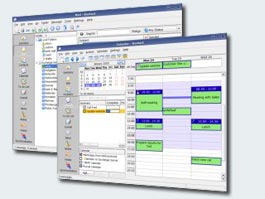Kontact/pl: Difference between revisions
(Updating to match new version of source page) |
No edit summary |
||
| Line 3: | Line 3: | ||
{|style="text-align:center" | {|style="text-align:center" | ||
|[[Image:Kontact_presentation_small.jpg|thumb|265px]]|| | |[[Image:Kontact_presentation_small.jpg|thumb|265px]]||'''Kontact''' jest zintegrowanym osobistym menadżerem informacji w KDE, ale może być także używany w innych systemach. | ||
Oferuje pocztę e-mail, książkę adresową, kalendarz, listę zadań i o wiele więcej.''' | |||
|} | |} | ||
<span class="mw-translate-fuzzy"> | <span class="mw-translate-fuzzy"> | ||
Revision as of 20:43, 28 May 2015
 |
Kontact jest zintegrowanym osobistym menadżerem informacji w KDE, ale może być także używany w innych systemach.
Oferuje pocztę e-mail, książkę adresową, kalendarz, listę zadań i o wiele więcej. |
Zespół Kontact gromadzi pod swoim dachem dojrzałe i sprawdzone użytki organizacyjne KDE. Dzięki sprawności technologii KPart istniejące użytki zespoliły się bezpośrednio w jeden.
Documentation for Kontact is also available.
How to get Kontact
Since Kontact is written in portable Qt technology, it is available on many different operating systems:
GNU/Linux
Kontact is available in all major GNU/Linux distributions. Please use the package manager or software center of your distribution to install it.
Windows
Maintaining Kontact for Windows is currently sponsored by Kolab Systems that provides installers at
http://mirror.kolabsys.com/pub/upload/windows/K3-Kontact-Beta-latest.exe
Składniki
KDE Kontact supports various groupware servers. When using these servers your workgroup has access to features like shared email folders, group task lists, calendar sharing, central address books and meeting scheduling.
Składniki użytku Kontact są dostosowane do wzajemnej współpracy. Dzięki temu wykazuje on takie cechy jak narzucający się mechanizm przenoszenia i upuszczania pomiędzy organizacją spotkań, zadaniami i kontaktami. Użytek Kontact obsługuje różne wymienniki pracy grupowej. Dzięki użyciu tych wymienników Wasza grupa robocza ma dostęp do takich cech jak wspólne przegródki pocztowe, grupowe spisy zadań, wspólne kalendarze, zakładowe spisy adresów i wyznaczanie spotkań.
W skład zespołu Kontact mogą wchodzić następujące użytki:
- Kanały
- Odczytujecie Wasze ulubione dostawy
- Wizytówki
- Zarządzacie Waszymi kontaktami
- KJots
- Wasze pomysły poukładane w postaci notatnika
- Poczta
- Wasz osobisty listonosz
- Usenet
- Odczytujecie publikacje Usenet
- Żółte karteczki
- Samoprzylepne notatki na pulpit
- Kalendarz
- Kalendarz i harmonogram oraz dziennik
- Ktimetracker
- Śledzi ile czasu spędzacie na różnych zadaniach
- Podsumowanie
- Podgląd podsumowania spraw zarządzanych przez Kontact
Zobacz także
- How to send SMS using Kontact
- Port to touch screen devices (like mobile handsets or tablets) (currently maemo/Windows Mobile/MeeGo)
Using Kontact with MyKolab.com
Kolab.org is a Free Software Groupware solution closely connected to KDE. The following page describes how to set up a MyKolab account with Kontact, but it works with any other Kolab Server as well.
Using Kontact with GMail and Google Data
- Working with GMail - Read your GMail in KMail
- Working with Google Calendar - Integrate Google Calendar with KOrganizer.
- Working with Google Contacts - Allow Google Contacts to synchronize with Kontact
Where to get help
There is a mailing list at
- kdepim-users - for users of the KDE PIM applications (Kontact, KAddressBook, KMail, KOrganizer, KNode, ...) subscribe to kdepim-users archive of kdepim-users. A team of developers and users aim to give answers as quickly as possible
and for urgent help, an IRC channel on Freenode
- for users and developers of Kontact - #kontact
Akonadi and KAddressBook
If you have problems concerning Akonadi and the new KAddressBook, there are pages dedicated to these issues
FAQ, Hints and Tips
Migrating your setup to a new distro
In KMail, right click on your Inbox and choose Properties. Go the Maintenance Tab. Have a look at the Location. It has either .kde4 or .kde in the path.
Substitute the appropriate path below.
You need the following config files:
- .kde4/share/config/emaildefaults
- .kde4/share/config/emailidentities
- .kde4/share/config/kmail.eventsrc
- .kde4/share/config/kmailrc
- .kde4/share/config/kaddressbookrc
- .kde4/share/config/kresources/contact
- .kde4/share/config/korgacrc
- .kde4/share/config/korganizerrc
- .kde4/share/config/knotesrc
- .kde4/share/config/mailtransports
And the following directories:
- .kde4/share/apps/kmail
- .kde4/share/apps/kabc
- .kde4/share/apps/korganizer
- .kde4/share/apps/knotes
If you use Akregator within Kontact, you will also need:
- .kde4/share/config/akregator.eventsrc
- .kde4/share/config/akregatorrc
And the whole .kde4/share/apps/akregator directory.
Of course the simplest way is just to keep your whole home directory.
Just a word of warning. If the directory naming is different between Desktops or between the two versions of your distro, this will not work as there are references to the directories within the config files. This means that if the files were in a .kde directory, you cannot just put them in a .kde4 directory without editing the references within the config files.
Hiding the Kontact Sidebar
On small screens, you may wish to reclaim the space used by the Kontact sidebar. You can replace it with an (editable) toolbar:
- Drag the left panel closed using the splitter between it and the main panel, job done. Don't forget to enable Navigator in every component.
Enabling SOCKS support in KMail and KNode
Unlike KDE 3, KDE 4 does not have built-in SOCKS support yet. However, it is still possible and relatively simple to make KMail and KNode use a SOCKS proxy, by using proxychains or other similar tools like tsocks or socksify. Assuming that proxychains is correctly installed and configured, all you need to do is to open a terminal (e.g. Konsole) and type:
proxychains kdeinit4
You don't even need to restart KMail/KNode! (You need to type the above command every time you start a new KDE session though).
Integrate the KDE-Telepathy VoIP module into Kontact / KAddressBook
See the Telepathy page.
